第4章 THE TALISMAN(4)
He bent his way toward the Pont Royal, musing over the last fancies of others who had gone before him. He smiled to himself as he remembered that Lord Castlereagh had satisfied the humblest of our needs before he cut his throat, and that the academician Auger had sought for his snuff-box as he went to his death. He analyzed these extravagances, and even examined himself; for as he stood aside against the parapet to allow a porter to pass, his coat had been whitened somewhat by the contact, and he carefully brushed the dust from his sleeve, to his own surprise. He reached the middle of the arch, and looked forebodingly at the water.
"Wretched weather for drowning yourself," said a ragged old woman, who grinned at him; "isn't the Seine cold and dirty?"His answer was a ready smile, which showed the frenzied nature of his courage; then he shivered all at once as he saw at a distance, by the door of the Tuileries, a shed with an inion above it in letters twelve inches high: THE ROYAL HUMANE SOCIETY'S APPARATUS.
A vision of M. Dacheux rose before him, equipped by his philanthropy, calling out and setting in motion the too efficacious oars which break the heads of drowning men, if unluckily they should rise to the surface; he saw a curious crowd collecting, running for a doctor, preparing fumigations, he read the maundering paragraph in the papers, put between notes on a festivity and on the smiles of a ballet-dancer;he heard the francs counted down by the prefect of police to the watermen. As a corpse, he was worth fifteen francs; but now while he lived he was only a man of talent without patrons, without friends, without a mattress to lie on, or any one to speak a word for him--a perfect social cipher, useless to a State which gave itself no trouble about him.
A death in broad daylight seemed degrading to him; he made up his mind to die at night so as to bequeath an unrecognizable corpse to a world which had disregarded the greatness of life. He began his wanderings again, turning towards the Quai Voltaire, imitating the lagging gait of an idler seeking to kill time. As he came down the steps at the end of the bridge, his notice was attracted by the second-hand books displayed on the parapet, and he was on the point of bargaining for some. He smiled, thrust his hands philosophically into his pockets, and fell to strolling on again with a proud disdain in his manner, when he heard to his surprise some coin rattling fantastically in his pocket.
A smile of hope lit his face, and slid from his lips over his features, over his brow, and brought a joyful light to his eyes and his dark cheeks. It was a spark of happiness like one of the red dots that flit over the remains of a burnt scrap of paper; but as it is with the black ashes, so it was with his face, it became dull again when the stranger quickly drew out his hand and perceived three pennies. "Ah, kind gentleman! carita, carita; for the love of St.
Catherine! only a halfpenny to buy some bread!"A little chimney sweeper, with puffed cheeks, all black with soot, and clad in tatters, held out his hand to beg for the man's last pence.
Two paces from the little Savoyard stood an old pauvre honteux, sickly and feeble, in wretched garments of ragged druggeting, who asked in a thick, muffled voice:
"Anything you like to give, monsieur; I will pray to God for you . . ."But the young man turned his eyes on him, and the old beggar stopped without another word, discerning in that mournful face an abandonment of wretchedness more bitter than his own.
"La carita! la carita!"
The stranger threw the coins to the old man and the child, left the footway, and turned towards the houses; the harrowing sight of the Seine fretted him beyond endurance.
"May God lengthen your days!" cried the two beggars.
As he reached the shop window of a print-seller, this man on the brink of death met a young woman alighting from a showy carriage. He looked in delight at her prettiness, at the pale face appropriately framed by the satin of her fashionable bonnet. Her slender form and graceful movements entranced him. Her skirt had been slightly raised as she stepped to the pavement, disclosing a daintily fitting white stocking over the delicate outlines beneath. The young lady went into the shop, purchased albums and sets of lithographs; giving several gold coins for them, which glittered and rang upon the counter. The young man, seemingly occupied with the prints in the window, fixed upon the fair stranger a gaze as eager as man can give, to receive in exchange an indifferent glance, such as lights by accident on a passer-by. For him it was a leave-taking of love and of woman; but his final and strenuous questioning glance was neither understood nor felt by the slight-natured woman there; her color did not rise, her eyes did not droop. What was it to her? one more piece of adulation, yet another sigh only prompted the delightful thought at night, "I looked rather well to-day."The young man quickly turned to another picture, and only left it when she returned to her carriage. The horses started off, the final vision of luxury and refinement went under an eclipse, just as that life of his would soon do also. Slowly and sadly he followed the line of the shops, listlessly examining the specimens on view. When the shops came to an end, he reviewed the Louvre, the Institute, the towers of Notre Dame, of the Palais, the Pont des Arts; all these public monuments seemed to have taken their tone from the heavy gray sky.